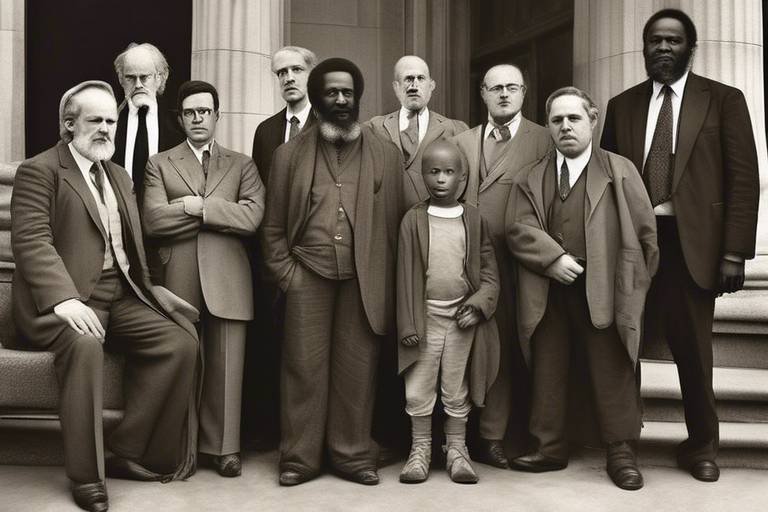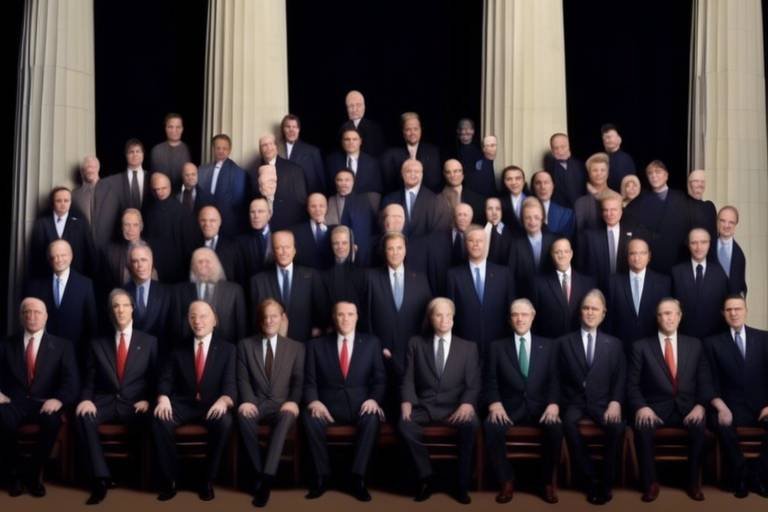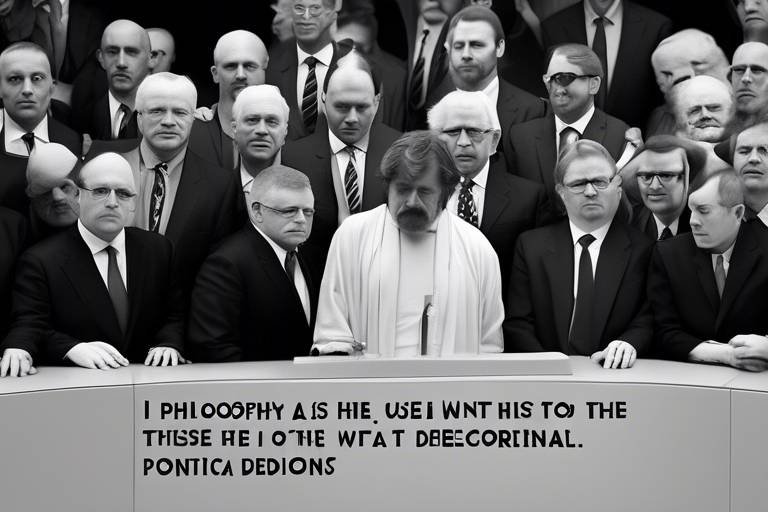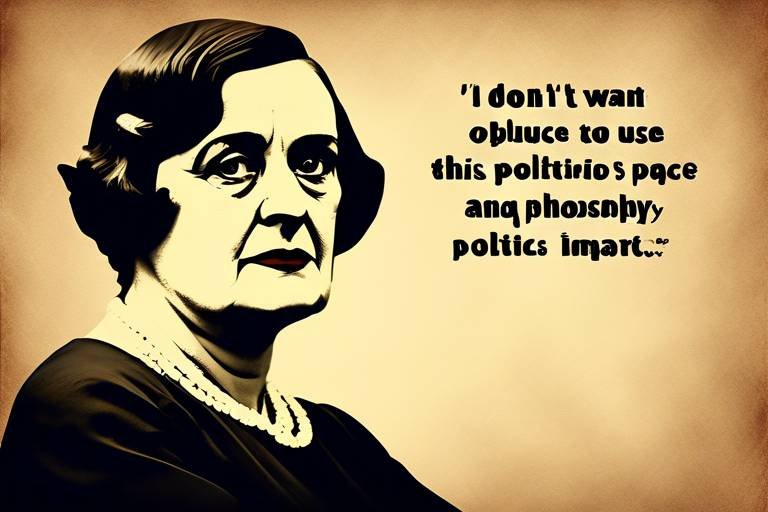Case for the Separation of Politics and Philosophy
The intricate dance between politics and philosophy has been a topic of discussion for centuries, yet the need for a clear distinction between the two remains as relevant as ever. At first glance, one might think these fields are intertwined, with philosophy providing the moral compass for political action. However, upon deeper examination, it becomes evident that conflating the two can lead to confusion and conflict. This article delves into the necessity of separating politics from philosophy, arguing that each discipline possesses its own methodologies and goals that can sometimes clash, ultimately enriching our understanding of both.
Politics is fundamentally about governance, power dynamics, and the structures that hold societies together. It’s like the framework of a house; without it, everything would collapse into chaos. Understanding the foundational principles of politics is essential, as it helps clarify how political systems operate and the implications of political decisions on everyday life. Think about it: every time a law is passed or a leader is elected, it’s not just a decision made in a vacuum. Those choices ripple through our communities, affecting everything from our education systems to our healthcare. By studying politics, we uncover the mechanisms that drive these changes and how they impact our daily lives.
On the flip side, philosophy dives deep into the fundamental questions that define our existence, knowledge, and ethics. It’s the quest for understanding that drives us to ponder life's biggest mysteries. Imagine philosophy as a vast ocean of ideas where each thought is a wave crashing against the shore of our consciousness. By examining these concepts, we gain valuable insights into human thought and behavior. However, it’s crucial to note that while philosophy can inform political practices, it should not dictate them. The beauty of philosophy lies in its ability to inspire critical thinking and ethical considerations without imposing a rigid framework on political action.
Throughout history, renowned thinkers have navigated the often murky waters of politics and philosophy. Their insights provide a lens through which we can understand the evolving dialogue between these two disciplines. For instance, consider the works of influential philosophers like Plato and Machiavelli. They shaped political thought significantly, but their ideas also serve as a cautionary tale about the dangers of merging philosophical ideals with political agendas. Analyzing their perspectives helps us appreciate the necessity for a separation in contemporary discourse.
Philosophers such as Plato and Machiavelli have left indelible marks on political thought. Plato’s vision of the ideal state and Machiavelli’s pragmatic approach to power demonstrate how philosophical ideas can influence political systems. Yet, these examples also highlight the potential pitfalls of conflating the two. When philosophical ideals overshadow practical governance, we risk falling into the traps of dogmatism and partisanship.
In more recent times, philosophers like John Rawls and Hannah Arendt have provided frameworks that emphasize the importance of maintaining distinct boundaries between moral philosophy and political action. Their works advocate for a separation that allows for ethical considerations in governance while respecting the diverse political ideologies that exist in society. This balance is crucial for fostering a healthy political environment where various perspectives can coexist without conflict.
When politics and philosophy intermingle, the consequences can be dire. The lack of a clear distinction can lead to an environment ripe for dogmatism and partisanship. For example, when political leaders adopt philosophical ideologies as absolute truths, they may disregard the complexities of real-world issues. This can result in policies that are more about ideological purity than effective governance, ultimately harming the very people they aim to serve. It’s essential to recognize that while philosophy can guide us, it should not dictate our political choices.
Separating politics from philosophy allows for clearer reasoning and decision-making. By drawing a line between the two, we create space for more objective approaches to governance. This division enables leaders to focus on pragmatic solutions rather than getting bogged down in ideological conflicts. Think about it: when political discussions are rooted in practical outcomes rather than philosophical debates, we open the door to more effective governance.
A distinct separation encourages healthier political debates. When ideas can be evaluated on their merits rather than their philosophical origins, we foster an environment where informed and constructive discussions can thrive. This shift not only enriches our political landscape but also empowers citizens to engage meaningfully in the democratic process.
Philosophy can serve as a guiding framework for ethical governance without dictating specific political outcomes. This balance allows for moral considerations while respecting the diverse political ideologies that exist in society. By embracing this separation, we can cultivate a political environment that values ethical reasoning without losing sight of practical governance.
- Why is it important to separate politics from philosophy?
Separating politics from philosophy allows for clearer reasoning and decision-making, fostering a more objective approach to governance. - How can philosophy inform political practices without dictating them?
Philosophy can provide ethical frameworks that guide decision-making while allowing for diverse political ideologies to coexist. - What are the dangers of conflating politics and philosophy?
Conflation can lead to dogmatism and partisanship, resulting in ineffective governance and policies that do not serve the public interest.

The Nature of Politics
Politics, at its core, is a dynamic and multifaceted arena that revolves around governance, power dynamics, and the intricate structures of society. It's not just about who gets elected or the policies they implement; it's about the very fabric that holds communities together. Imagine a bustling city where every decision made by its leaders ripples through the lives of its citizens. From the allocation of resources to the enactment of laws, politics shapes our daily experiences in profound ways.
To truly grasp the essence of politics, we must delve into its foundational principles. These principles form the backbone of political systems, guiding how they operate and influencing the implications of political decisions on everyday life. For instance, consider the principle of democracy. It's not merely a method of governance; it's a philosophy that emphasizes the importance of individual voices and collective decision-making. When citizens participate in the political process, they contribute to a system that ideally reflects their values and needs.
However, politics is also rife with complexities. Power dynamics play a pivotal role in shaping political landscapes. Different groups vie for influence, often leading to a tug-of-war where the loudest voices dominate the conversation. This can create an environment where marginalized perspectives struggle to be heard, raising questions about the fairness of the political process. For instance, when political decisions favor a select few, the broader community may feel disenfranchised. This highlights the necessity for transparency and accountability in governance, ensuring that all voices matter.
Moreover, the structures of society—such as institutions, laws, and cultural norms—also influence political behavior. These structures can either empower citizens or constrain them, leading to a complex interplay between individual agency and systemic limitations. To illustrate, think of a tree: the roots represent the foundational laws and institutions, while the branches symbolize the various political entities and movements that grow from these roots. Without a strong foundation, the tree cannot flourish, just as a political system without robust institutions may struggle to serve its citizens effectively.
In summary, understanding the nature of politics requires a comprehensive view that encompasses governance, power dynamics, and societal structures. By acknowledging these elements, we can better appreciate the complexities of political life and the significant impact it has on our everyday experiences. As we navigate through political discussions, it's crucial to remember that politics is not just a distant realm of power; it is an integral part of our lives that shapes our communities and our futures.

The Essence of Philosophy
Philosophy is not just an academic discipline; it is a profound exploration of the very fabric of our existence. At its core, philosophy grapples with the **fundamental questions** that define our lives: What does it mean to be human? How do we know what we know? What is the nature of good and evil? These inquiries are not merely abstract; they shape our understanding of the world and our place within it. By engaging with philosophical thought, we embark on a journey that challenges our assumptions and broadens our perspectives.
One of the most intriguing aspects of philosophy is its **ability to provoke thought** and stimulate critical thinking. Unlike politics, which often focuses on the pragmatic aspects of governance and power, philosophy invites us to delve deeper into the **why** behind our beliefs and actions. It encourages us to question the status quo and consider alternative viewpoints. For instance, ethical philosophy prompts us to evaluate the moral implications of our choices, both individually and collectively. This reflective process is essential, as it fosters a more nuanced understanding of the complexities of human behavior.
Moreover, philosophy serves as a **framework for understanding** various aspects of life, including ethics, aesthetics, and metaphysics. Each branch of philosophy offers unique insights that can inform our decision-making processes. For example, ethical theories such as utilitarianism and deontology provide different lenses through which we can analyze moral dilemmas. By studying these theories, we can develop a more comprehensive understanding of what constitutes ethical behavior in political contexts.
In essence, philosophy is a **tool for personal and societal growth**. It encourages us to engage in meaningful dialogue and cultivate empathy towards differing perspectives. By exploring philosophical concepts, we can challenge our preconceptions and foster a more inclusive society. This is particularly important in today’s polarized political climate, where understanding and tolerance are often overshadowed by conflict and division.
To illustrate the depth of philosophical inquiry, consider the following table that outlines some of the key branches of philosophy and their focus areas:
| Branch of Philosophy | Focus Area |
|---|---|
| Metaphysics | The nature of reality and existence |
| Epistemology | The study of knowledge and belief |
| Ethics | Morality and principles of right conduct |
| Aesthetics | The nature of beauty and artistic value |
| Logic | The principles of valid reasoning |
In conclusion, the essence of philosophy lies in its **ability to illuminate** the human experience. By engaging with philosophical ideas, we not only enrich our understanding of ourselves but also enhance our capacity for critical thought and ethical reasoning. This journey of exploration is vital, especially in a world where the lines between politics and personal beliefs often blur. Philosophy, therefore, stands as a beacon of clarity, guiding us through the complexities of life and governance.
- What is the primary purpose of philosophy? Philosophy aims to explore fundamental questions about existence, knowledge, and ethics, providing a framework for understanding the world.
- How does philosophy differ from politics? While politics deals with governance and power dynamics, philosophy focuses on abstract concepts and ethical considerations, often serving as a guide for political action.
- Can philosophy influence political decisions? Yes, philosophical ideas can inform political thought, helping to shape ethical governance without dictating specific political outcomes.

Historical Perspectives
The relationship between politics and philosophy has been a topic of discussion for centuries, with various thinkers contributing to the evolving dialogue. Understanding this historical context is essential for grasping why a separation between these two disciplines is necessary today. Let's take a journey through time to explore how different eras and thinkers have shaped our understanding of politics and philosophy.
In ancient Greece, Plato introduced the idea of the philosopher-king, suggesting that the most knowledgeable individuals should govern society. He believed that philosophy could guide political decisions, emphasizing the role of ideal forms and justice. However, this notion raises questions about the practicality of such governance. Can a philosopher truly understand the complexities of political life? Plato's vision, while noble, risks conflating philosophical ideals with the messy realities of political power.
Moving forward in time, we encounter Machiavelli, whose work "The Prince" starkly contrasts with Plato's ideals. Machiavelli argued that politics is inherently about power and pragmatism, often requiring actions that may be deemed immoral by philosophical standards. His perspective highlights the potential dangers of merging philosophical ideals with political action, suggesting that a clear distinction is necessary to avoid ethical pitfalls. Machiavelli’s candid approach serves as a reminder that while philosophy can inform political thought, it should not dictate it.
Fast forward to the modern era, where thinkers like John Rawls and Hannah Arendt have made significant contributions to the discourse on politics and philosophy. Rawls introduced the concept of justice as fairness, advocating for a political framework grounded in moral philosophy without directly imposing philosophical doctrines on governance. His work emphasizes that while philosophy can provide valuable insights, it should not overshadow the practicalities of political decision-making. Similarly, Arendt's exploration of totalitarianism and the nature of power demonstrates the necessity of maintaining a boundary between philosophical inquiry and political action.
Throughout history, the dialogue between politics and philosophy has evolved, revealing the complexities and challenges inherent in their relationship. The perspectives of these influential thinkers illustrate the importance of recognizing the distinct methodologies and goals of each discipline. By understanding their contributions, we can better appreciate the necessity of separating politics from philosophy, allowing for a more nuanced and effective approach to governance.
As we reflect on these historical perspectives, it becomes clear that the interplay between politics and philosophy is rich and intricate. The lessons learned from past thinkers can guide contemporary discourse, reminding us that while philosophy can illuminate ethical considerations, it should not dictate political action. This separation allows for a more pragmatic approach to governance, fostering discussions that are not only informed but also constructive.
- Why is it important to separate politics from philosophy?
Separating politics from philosophy allows for clearer reasoning and decision-making, enabling leaders to focus on pragmatic solutions rather than ideological conflicts.
- How have historical thinkers influenced this separation?
Thinkers like Plato and Machiavelli have shown the dangers of conflating philosophical ideals with political realities, highlighting the need for distinct boundaries.
- Can philosophy still play a role in politics?
Yes, philosophy can serve as a guiding framework for ethical governance while respecting diverse political ideologies.

Influential Philosophers
Throughout history, the interplay between politics and philosophy has been shaped significantly by numerous influential thinkers. These philosophers not only explored the depths of human thought but also laid the foundations for political theories that continue to resonate today. For instance, Plato, one of the most renowned philosophers of ancient Greece, proposed the idea of the "philosopher-king." He believed that the best rulers would be those who possess wisdom and virtue, thus merging philosophical ideals with political governance. This vision raises an intriguing question: can true wisdom exist within the chaotic realm of politics?
On the other hand, Machiavelli presented a more pragmatic approach in his seminal work, The Prince. He argued that the ends often justify the means, suggesting that rulers should prioritize effectiveness over morality. This stark contrast between Plato's idealism and Machiavelli's realism illustrates the tension between philosophical ideals and political necessity. While Plato sought a just society led by enlightened rulers, Machiavelli acknowledged the brutal realities of power dynamics, forcing us to confront the uncomfortable truth: is it possible to govern ethically in an inherently flawed world?
As we move into the modern era, thinkers like John Rawls and Hannah Arendt have further contributed to the discourse on the separation of politics and philosophy. Rawls, in his influential work A Theory of Justice, emphasizes the importance of fairness and equality in political structures, proposing the "veil of ignorance" as a thought experiment to foster impartiality in political decision-making. Meanwhile, Arendt's exploration of totalitarianism and the nature of power encourages us to scrutinize the ethical implications of political actions, reminding us that philosophy can illuminate the darker corners of governance without dictating its course.
These philosophers exemplify how political thought can be enriched by philosophical inquiry while also highlighting the dangers of conflating the two. Their contributions serve as a reminder that while philosophy can inform political practices, it must not overshadow the practical realities of governance. By understanding their perspectives, we gain a deeper appreciation for the necessity of maintaining a clear distinction between politics and philosophy, allowing each discipline to thrive in its own right.
- Why is it important to separate politics from philosophy?
The separation allows for clearer reasoning and decision-making in governance, fostering a more objective approach. - How do influential philosophers impact modern politics?
They provide frameworks and ideas that help shape political thought while emphasizing the need for ethical considerations. - What are the dangers of conflating politics and philosophy?
Conflation can lead to dogmatism, partisanship, and a lack of constructive political discourse.

Modern Thinkers
In the realm of contemporary thought, philosophers like John Rawls and Hannah Arendt have made significant contributions that emphasize the necessity of separating politics from philosophy. Their works offer profound insights into how moral frameworks can coexist with political action without becoming entangled. For instance, Rawls' concept of justice as fairness illustrates how ethical considerations can guide political frameworks while maintaining a clear boundary between the two disciplines. He argues that a just society is one where the principles of justice are not only understood but also applied without bias, irrespective of the political ideologies at play.
On the other hand, Hannah Arendt’s explorations into the nature of power and authority provide a critical lens through which we can view the separation of these fields. In her seminal work, The Human Condition, Arendt discusses the importance of public discourse and political action, emphasizing that while philosophy can inform our understanding of human nature and ethics, it should not dictate the terms of political engagement. She famously stated that "the aim of politics is freedom," suggesting that the political sphere should be a space for diverse ideas and practices rather than a battleground for philosophical dogmas.
Moreover, these modern thinkers highlight the risks associated with conflating political and philosophical thought. When political decisions are overly influenced by philosophical ideologies, it can lead to a rigid adherence to certain principles that may not be suitable for the complexities of governance. For example, if a government were to base its policies solely on a specific philosophical doctrine, it might overlook the practical realities and diverse needs of its citizens. This is where the importance of maintaining a distinct separation becomes evident, allowing for a more adaptable and responsive political landscape.
To further illustrate the impact of modern thinkers on the discourse surrounding politics and philosophy, consider the following table that summarizes their key contributions:
| Philosopher | Key Contribution | Impact on Politics |
|---|---|---|
| John Rawls | Justice as Fairness | Promotes equitable political frameworks |
| Hannah Arendt | Power and Authority | Encourages diverse political engagement |
| Amartya Sen | Development as Freedom | Links economic policies to individual freedoms |
In conclusion, the works of modern thinkers like Rawls and Arendt underscore the importance of keeping politics and philosophy distinct yet interconnected. Their insights remind us that while philosophical frameworks can guide ethical governance, they must not overshadow the practical necessities of political action. This balance is crucial for fostering a political environment that is both just and responsive to the needs of all citizens.
- Why is it important to separate politics from philosophy?
The separation allows for clearer reasoning and decision-making, preventing dogmatism and enabling more effective governance. - How do modern thinkers contribute to this separation?
Thinkers like Rawls and Arendt provide frameworks that emphasize the distinct roles of ethics and politics, ensuring that one does not overshadow the other. - What are the consequences of conflating politics with philosophy?
When the two are mixed, it can lead to rigid ideologies that fail to address the complexities of governance and the diverse needs of society.

Implications of Conflation
When politics and philosophy are intertwined, the result can often be a muddled understanding of both realms. This conflation leads to a series of negative consequences that can compromise the integrity of political discourse and philosophical inquiry. For instance, when political ideologies are heavily influenced by philosophical doctrines, it can create an environment where dogmatism flourishes. This means that individuals may become so entrenched in their beliefs that they cease to engage in open-minded discussion, which is essential for a healthy democracy.
Moreover, the merging of these two fields can foster partisanship, where political allegiance overshadows critical thinking. Instead of evaluating policies based on their effectiveness, individuals may prioritize their philosophical alignment with a particular political party. This can result in a polarized society where collaboration and compromise become nearly impossible. In essence, the lack of separation can lead to a toxic environment where political debates devolve into shouting matches rather than constructive dialogues.
To illustrate the implications of this conflation, consider the following consequences:
- Dogmatism: A rigid adherence to specific ideologies can stifle innovation and progress.
- Partisanship: Loyalty to a party can overshadow the pursuit of truth and justice.
- Polarization: Society becomes divided, making it challenging to find common ground on critical issues.
Furthermore, when philosophical ideas are misapplied to political contexts, it can lead to misguided policies that do not reflect the complexities of human experience. For example, a philosophical argument advocating for absolute freedom may ignore the necessity of certain regulations to maintain social order. This disconnect can result in policies that are either too rigid or too lenient, failing to address the nuanced realities of governance.
In summary, the implications of conflating politics and philosophy are profound and far-reaching. By failing to recognize the distinct methodologies and goals of each discipline, we risk creating a landscape where dogmatism reigns, collaboration falters, and effective governance becomes a distant dream. It is essential for both fields to maintain their boundaries, allowing for a more enriched and productive dialogue that can ultimately benefit society as a whole.
- Why is it important to separate politics from philosophy?
Separating the two allows for clearer reasoning and decision-making, fostering a more objective approach to governance. - What are the risks of conflating politics and philosophy?
Conflation can lead to dogmatism, partisanship, and polarized debates, hindering effective governance. - Can philosophy inform political practices?
Yes, philosophy can serve as a guiding framework for ethical governance without dictating specific political outcomes.

Benefits of Separation
Separating politics from philosophy is not just a theoretical exercise; it has tangible benefits that can significantly improve how societies function. When these two fields are kept distinct, we open the door to clearer reasoning and more effective decision-making. Imagine trying to navigate a ship through foggy waters without a compass. That’s what it feels like when political leaders mix philosophical ideologies with practical governance. By establishing a clear boundary, we allow leaders to focus on pragmatic solutions without being bogged down by ideological conflicts.
One of the most significant advantages of this separation is the enhancement of political discourse. When political discussions are rooted in practical implications rather than philosophical dogmas, they become more constructive and less divisive. This environment encourages participants to evaluate ideas based on their merits rather than the philosophical backgrounds from which they emerge. As a result, debates become less about defending a particular ideology and more about finding common ground and practical solutions. Picture a roundtable where everyone is focused on solving a puzzle rather than arguing about which piece belongs where—this is the type of dialogue that can flourish when politics and philosophy are kept apart.
Moreover, philosophy can still play a crucial role in guiding ethical governance without dictating specific political outcomes. It offers a framework for moral considerations that can inform political decisions while respecting the diversity of political ideologies. For instance, a political leader might draw on philosophical principles related to justice and fairness when crafting policies but will ultimately make decisions based on the practical realities of governance. This balance ensures that ethical considerations are part of the conversation without overshadowing the need for actionable solutions.
To illustrate the benefits of this separation further, consider the following table that highlights key advantages:
| Benefit | Description |
|---|---|
| Clearer Reasoning | Political decisions become more practical and less influenced by ideological biases. |
| Enhanced Discourse | Encourages constructive debates focused on solutions rather than philosophical origins. |
| Guided Ethics | Philosophy provides a moral framework without dictating specific political outcomes. |
In summary, separating politics from philosophy is not merely an academic pursuit; it’s a practical necessity. By doing so, we foster a political environment that is more rational, inclusive, and effective. The benefits are clear: enhanced discourse, clearer reasoning, and a guided ethical framework that respects diverse political ideologies. As we navigate the complexities of modern governance, keeping these fields distinct will help us chart a course toward a more harmonious and functional society.
- Why is it important to separate politics from philosophy? Keeping these disciplines distinct allows for clearer reasoning and more effective governance, reducing ideological conflicts.
- How does this separation enhance political discourse? It encourages discussions based on practical implications rather than philosophical backgrounds, leading to more constructive debates.
- Can philosophy still influence politics? Yes, philosophy can guide ethical considerations in governance without dictating specific political outcomes.

Enhanced Political Discourse
When we talk about , it’s like opening a window to fresh air in a stuffy room. By separating politics from philosophy, we create an environment where ideas can breathe, grow, and evolve without being stifled by dogma or rigid ideological constraints. Imagine a vibrant marketplace of ideas where every thought is evaluated on its own merit, rather than being judged by its philosophical pedigree. This is the essence of enhanced political discourse.
In a landscape where politics and philosophy are intertwined, discussions often devolve into heated arguments where individuals defend their positions not based on the strength of their ideas, but rather on the philosophical frameworks that back them. This can lead to a toxic atmosphere where partisanship reigns supreme, and genuine dialogue is replaced by shouting matches. By maintaining a clear boundary between these two disciplines, we encourage a more objective approach to political discussions. This means that debates can focus on practical solutions rather than getting bogged down in abstract philosophical concepts that may not be relevant to the issues at hand.
Furthermore, when political discourse is enhanced through this separation, we open the door for a variety of voices to contribute. Just like a symphony orchestra, where each instrument plays a unique role, a diverse range of perspectives can enrich our understanding of political issues. This diversity allows for a more comprehensive view of the challenges we face and fosters innovative solutions. Here are some key benefits of this enhanced discourse:
- Informed Discussions: When ideas are evaluated independently, participants are more likely to engage with the content rather than the source.
- Constructive Criticism: A clear separation enables constructive feedback, allowing for improvement and refinement of ideas.
- Increased Collaboration: Different political ideologies can find common ground, leading to collaborative solutions that benefit society as a whole.
Ultimately, enhanced political discourse is about creating a space where ideas can flourish. It’s about fostering an environment where individuals feel comfortable sharing their thoughts, knowing that their contributions will be evaluated fairly. Just as a gardener tends to a variety of plants, nurturing their growth, we too must cultivate our political conversations. This nurturing can lead to a more engaged and informed citizenry, capable of tackling the complex issues of our time.
In conclusion, separating politics from philosophy not only clarifies our discussions but also enriches them. By allowing ideas to stand on their own, we encourage a political culture that values reason over rhetoric, collaboration over conflict, and understanding over division. This is the path to a more vibrant and effective democracy.
- Why is it important to separate politics from philosophy? Separating the two allows for clearer reasoning and decision-making, reducing dogmatism and fostering more informed discussions.
- How can enhanced political discourse benefit society? It encourages diverse perspectives, leading to more innovative solutions and healthier political debates.
- What are the dangers of conflating politics and philosophy? It can result in partisanship and a lack of constructive dialogue, stifling the growth of ideas.

Philosophy as a Guide
Philosophy, at its core, serves as a profound compass for navigating the complex terrain of governance and ethical decision-making. It does not dictate specific political outcomes but instead offers a framework for understanding the moral implications of our choices. Imagine philosophy as a lighthouse, illuminating the way through the fog of political ideologies, ensuring that leaders and citizens alike can see the broader picture beyond their immediate interests.
In a world where political landscapes are often marred by partisanship and emotional rhetoric, philosophical inquiry encourages a more thoughtful approach. It invites us to ask critical questions such as: What is justice? What does it mean to lead ethically? By grappling with these fundamental issues, we cultivate a deeper understanding of the values that should underpin our political systems.
Moreover, philosophy promotes a culture of dialogue and reflection. When political leaders engage with philosophical principles, they are more likely to consider diverse perspectives and foster inclusive governance. This is crucial in a pluralistic society where differing beliefs and values coexist. For instance, a leader who understands the philosophical concept of utilitarianism might prioritize policies that aim for the greatest good for the greatest number, while another might lean towards deontological ethics, focusing on the morality of actions themselves regardless of the outcomes.
To illustrate the role of philosophy in guiding political action, consider the following table that outlines key philosophical frameworks and their implications for governance:
| Philosophical Framework | Core Principle | Political Implication |
|---|---|---|
| Utilitarianism | Maximizing overall happiness | Policies focused on public welfare and collective benefit |
| Deontology | Adherence to moral rules | Emphasis on rights and duties in legislation |
| Virtue Ethics | Character and virtue as central to morality | Encouragement of ethical leadership and integrity |
By utilizing these philosophical frameworks, political leaders can make more informed decisions that reflect not only their personal beliefs but also the collective values of the society they serve. This approach can lead to a more ethical and balanced governance structure, where policies are not merely reactions to current events but are instead grounded in a thoughtful consideration of moral principles.
In conclusion, while philosophy does not provide a one-size-fits-all solution to political dilemmas, it undeniably enriches the decision-making process. By allowing philosophical inquiry to inform political action, we can create a governance model that respects ethical considerations while navigating the complexities of modern society. This balance is essential for fostering a political environment where diverse ideologies can coexist and thrive.
- Why is it important to separate politics from philosophy?
Separating these disciplines allows for clearer reasoning, preventing dogmatism and promoting objective decision-making.
- Can philosophy influence political decisions?
Absolutely! Philosophy provides a framework for ethical considerations that can guide political actions without dictating specific outcomes.
- How can political leaders benefit from philosophical insights?
Philosophical insights can help leaders understand diverse perspectives, leading to more inclusive and effective governance.
Frequently Asked Questions
- Why is it important to separate politics from philosophy?
Separating politics from philosophy is crucial because each discipline has its own methodologies and goals. Politics focuses on governance and power dynamics, while philosophy delves into fundamental questions about existence and ethics. When we keep them distinct, we allow for clearer reasoning and decision-making, avoiding the pitfalls of dogmatism and partisanship.
- How can conflating politics and philosophy affect society?
When politics and philosophy intermingle, it can lead to negative consequences such as dogmatism and polarized viewpoints. This conflation can stifle healthy debate and result in decisions that are more ideological than practical, ultimately affecting governance and societal well-being.
- What role does philosophy play in political discourse?
Philosophy serves as a guiding framework for ethical governance. It helps in shaping moral considerations without dictating specific political outcomes. By maintaining this balance, we can respect diverse political ideologies while still addressing ethical concerns in governance.
- Can you give examples of influential thinkers who addressed the politics-philosophy relationship?
Absolutely! Thinkers like Plato and Machiavelli have greatly influenced political thought. Their works illustrate the interplay between philosophical ideas and political systems, highlighting the importance of distinguishing between the two to avoid potential dangers in governance.
- What benefits arise from a clear separation of politics and philosophy?
A clear separation allows for enhanced political discourse, where ideas can be evaluated on their own merits rather than being overshadowed by their philosophical origins. This leads to more informed discussions and pragmatic solutions to governance challenges.
- How do modern philosophers contribute to this separation?
Contemporary philosophers like John Rawls and Hannah Arendt emphasize the importance of separating moral philosophy from political action. They provide frameworks that help maintain distinct boundaries, ensuring that philosophical insights inform politics without overshadowing practical governance.



















